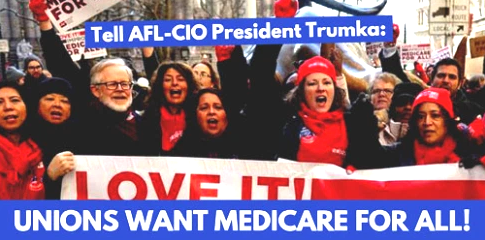Nothing Short of a Single-Payer Health Plan Will Do


Originally published on 10/5/2019
By Labor Fightback Network
Since the enactment of the “Patient Protection and Affordable Care Act” (ACA) in 2009, congressional Republicans have vowed to “repeal and replace Obamacare.” For seven years that promise was never anything more than a campaign slogan — no Republican ever offered an alternative health plan to Barack Obama’s signature legislation.
In the 2016 elections the Republicans won it all: majorities in the Senate and House of Representatives and, surprisingly, the presidency. Suddenly, the Republicans had to make the transition from an opposition party to a governing party, and if they were to keep their promise to “repeal and replace Obamacare,” they had to come up with a new health plan with which to “replace.”
As rumors began to surface about Republican plans for “reforming” the health care “system,” anti-Trump activists began confronting Republican members of Congress at Town Hall meetings in the congressional districts, angrily defending the ACA from Republican threats to dismantle it. The numbers of people involved were actually larger than the right-wing “Tea Party” crowds which bedeviled the Democrats at the beginning of the Obama administration. Republican legislators who actually believed the lie that the people were with them were nonplussed, in some cases even intimidated from holding Town Hall meetings with their constituents.
At the beginning of March 2017 the Republican health plan went from rumors to an actual bill, the “American Health Care Act” (AHCA). The rumors did not do it justice. It was actually worse than people had expected. There was something in the bill for everyone — except the very rich — to hate.
The Congressional Budget Office Report on the “American Health Care Act”
According to the bipartisan Congressional Budget Office (CBO), twenty-four million Americans would lose their health insurance coverage under the Republican plan — fourteen million in its first year, as reported in the March 14, 2017, issue of the New York Times. The CBO also estimated that premiums for those who buy insurance on their own would rise by fifteen to twenty percent in the first two years of the plan, and then level off in 2020. Under AHCA, private insurance companies would be allowed to charge seniors five times the premiums that it charges to younger Americans. The American Association of Retired Persons (AARP) said this in a statement: “Before people even reach retirement age, big insurance companies could be allowed to charge them an age tax that adds up to thousands of dollars more per year. Older Americans need affordable health care services and prescriptions. This plan goes in the opposite direction, increasing insurance premiums for older Americans and not doing anything to lower drug costs.”
However, the Republican plan hits Medicaid the hardest. Federal spending for Medicaid, according to the CBO, would be twenty-five percent lower, causing fourteen million people to lose their health care under Medicaid. Who are Medicaid recipients? They are the poor, the disabled, and the young — the most vulnerable in our society. Many are full-time workers whose pay is so low that they qualify for Medicaid, and of course their employers do not provide health coverage.
The AHCA does lower taxes for the very rich, and, according to the CBO, it would reduce federal spending by $337 billion over the next decade. The tax reductions for the rich and the spending reductions for the federal government may persuade reluctant Republican reactionaries to support a bill which does not return health care to the misnamed “free market” — increasing the likelihood that the bill can pass both houses of Congress and become law, which would be a disaster for working families. Ironically, the working families who are likely to be hardest hit are in areas which voted heavily for Donald John Trump in the 2016 election.
The ACA Has Not Been a Good Plan
It should be understood that the health care plan that the Republicans are “repealing and replacing” was not a good plan for working people and the poor. One can make a valid argument that it was better than nothing at all or than the previous non-system, in which insurance companies could deny coverage to young adults whose parents were covered, or to people who had “pre-existing conditions.” Those provisions remain under the AHCA.
However, it should be understood that there is a difference between having health insurance and getting health care. Far too many Americans who bought health insurance under ACA found that out the hard way. High deductibles, high co-pays, and lack of coverage for many procedures and medications meant high out-of-pocket expenses — added on to premiums that were at a minimum several hundred dollars a month. Of course, for far too many working people, that is exactly what they have had for many years under their employer-provided health insurance. At the time the ACA was first being proposed, President Obama told the American people, “The good news is that if you like your health insurance you get to keep it.” What he should have said was, “If your boss likes your health insurance, you’re stuck with it.”
Since the roll-out of the ACA in 2014 it has been plagued with one problem after another, from a poorly coded website which made it next to impossible for people to enroll, to confusion concerning the tax subsidies for which people qualified — and their actual cost to acquire health insurance, to rising premiums each year. Workers whose unions have health and welfare plans are all too familiar with insurance companies who “low ball” premium estimates to get the business and then raise the premiums substantially in each year of the contract, so that by the end, employer contributions are no longer sufficient to cover the costs.
Health insurance marketplaces under ACA were set up by the states — or not. People in those states which did not set up a marketplace were stuck with the federal system, and the plans offered to them generally were not as good. The full effect of Obamacare’s insurance coverage was further limited by the Supreme Court’s ruling that made states’ Medicaid expansion optional. The most reactionary of governors took the hint, refusing to extend coverage to millions of our most vulnerable citizens.
Many insurance companies simply pulled out of the ACA, leaving enrollees with no choice. It became cost-effective for people simply to forego buying insurance and paying the fine for not doing so. When Speaker of the House Paul Ryan said that the ACA was “imploding,” he was unfortunately correct. The AHCA, which he has offered as an alternative, continues and accelerates the implosion.
A Better Answer: Medicare for All
In their campaign to preserve, protect, and defend the ACA, the Democrats have unfortunately given up on a plan which actually could improve health care for working families of all. This is the Medicare for All plan, first introduced by Michigan Congressman John Conyers over a decade ago as H.R. 676. Senator Bernie Sanders of Vermont has introduced similar legislation in the Senate. It would provide health coverage to all Americans under the existing Medicare system — everybody in, nobody out. It would bring the United States into step with the rest of the industrialized world, where working people have fought for and won single-payer health care systems.
Working families would be the big gainers under a Medicare for All plan. The losers would be the giant health insurance companies and big pharmaceutical companies, who have been enriching themselves for decades at working people’s expense. Breaking the power of these giant corporations would improve not only the delivery of health care but the quality of health care as well, as health priorities would shift away from astronomical drug profits to actual healing of the sick and prevention of disease.
The Democrats have refused to lift a finger for a health plan that would actually benefit the people who vote for their party. It’s time for working people to tell the Democrats — and the Republicans and their demagogic President Donald John Trump — that if they refuse to provide us with a health care plan that actually benefits us, we will elect people who will, independent candidates whom we choose and who are responsible to us, not to the insurance bosses, pharmaceutical executives, and Wall Street speculators. The time is now.

